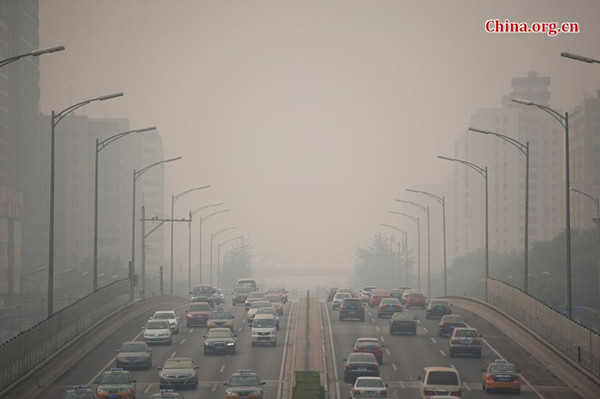Hurdles remain for vehicle curbs
 0 Comment(s)
0 Comment(s) Print
Print E-mail China Daily, October 10, 2013
E-mail China Daily, October 10, 2013
Experts question plans to reduce traffic pollution
Attempts to halve the number of vehicles on Beijing's roads on days when there are seriously high levels of pollution still face challenges, experts say.
|
Dense smog enshrouds the Chinese capital of Beijing again on Thursday morning, lowering the visibility to less than 200 meters on the 3rd Ring Rd. [Photo/Chen Boyuan/China.org.cn] |
The capital's transport authority is planning to restrict cars and vans according to odd or even license numbers on days of heavy pollution.
The move comes at a time of rising public concern about air pollution in the capital.
The traffic control measure is aimed at tackling one of the major causes of fine particulate matter and to ease heavy smog in the city, said Beijing Environmental Protection Bureau.
However, in view of the need to inform commuters about the traffic controls in advance, along with the difficulty of predicting days when there will be serious pollution, experts said the plan is not easy and could cause chaos if carried out poorly.
"It is necessary to inform the public in advance," said Xie Shaodong, a professor at Peking University's School of Environmental Sciences.
Based on the current prediction capability, it is feasible to forecast the pollution level three days in advance, he said.
The authorities say they are studying further details to avoid unnecessary inconvenience to the public, while insiders say it is likely the plan will be launched by the end of the year.
Qiao Lin, director of the Beijing Meteorological Bureau, said predicting days when there is serious pollution requires joint efforts from the meteorological and environmental protection bureaus.
The meteorological department is in charge of forecasting weather conditions and monitoring serious pollution, while the Environmental Protection Bureau is responsible for monitoring and warning of major pollutants.
Xie said restricting vehicles according to their license plate numbers will have an effect, but this might be negative if the forecast is inaccurate.
Wang Gengchen, a researcher at the Chinese Academy of Sciences' Institute of Atmospheric Physics, is also worried about the negative effect of inaccurate weather forecasting.






